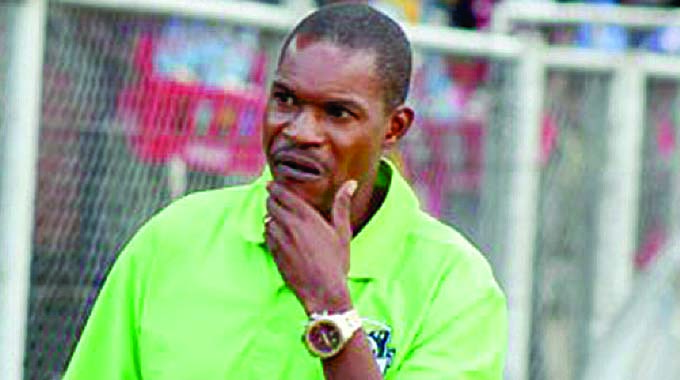For Norman, it’s like reliving a nightmare

Sports Reporter
FOR Norman Mapeza, it’s like reliving his worst nightmare — same country, same tactics to try and frustrate him, and his team, same opponents.
Although almost 25 years have passed, the Warriors interim coach can now see that, in African football, the more things change, the more they stay the same.
Mapeza is back in Ghana, this time for a 2022 World Cup battle against the Black Stars, having been handed the responsibility to try and revive his country’s campaign, which has gone off the rails.
He is the only member of the Class of Warriors, who were in Ghana for a 1998 AFCON qualifier, in July 1997, who has returned on this tour of duty.
And, while 24 years have passed, some of the same dark arts, which plagued their mission back then, remain.
The template, which the Ghanaians used back then, to try and frustrate the Warriors, by giving them a sub-standard pitch, for their training sessions, is the one they have turned to again, this time around.
It meant that the Warriors were forced to abandon one of their training sessions, because the pitch they had been allocated to use, was very bumpy and they even feared some of their players could get injured.
“The pitch was very bad, it was hard and very bumpy and giving the players a run on that surface was very risky,’’ said Warriors team manager, Wellington Mpandare.
“We asked for an alternative venue but even that one was not good enough because of the long grass.
“We ended up losing valuable time, which we should have been using for our preparations and, it’s sad that, such things still happen in today’s football.’’
Mpandare knows the trick, it’s something he has also confronted before, with the hosts trying to use every means possible, to try and frustrate the visitors.
And, so does Mapeza, who was part of the Warriors, when they were given the same treatment, in Accra, when they came for their ’98 Nations Cup qualifier.
It provided a compelling drama, which also played out in the pages of this newspaper, when an article, giving a graphic description of that shocking sub-standard training ground, was published in The Herald.
“A rumble in the jungle probably best describes Zimbabwe’s forgettable first training session here for their no-holds-barred African Cup of Nations soccer qualifier against Ghana at the Accra Sports Stadium on Sunday,’’ read the report, published in this newspaper, on July 11, 1997.
“On a small cleared field, in the middle of a dense forest just opposite the University of Ghana, the Warriors found themselves sweating it out at a training session that could easily have passed for a game between ancient tribes, who lived in the forest.
“The little bumpy pitch would have qualified, for any name, except a football ground had it not been for the goal posts on either end where goalkeepers could hardly go because of the dense growth behind the posts.
“There were no lines to mark where the field started, or ended, and even if the markings had been there before, they must surely have disappeared long ago, under the grass.
“The Zimbabwe players did not shoot a single ball, during their two-hour session, afraid that the balls would balloon into the dense bushes and never be seen again.
“Cold comfort for the Warriors is that the small pathetic pitch was probably the best they could get out of the three they had been offered.
“One of the fields had long grass on which the ball could barely move, some dogs could be seen playing near the centre, probably the only place, on the pitch that was bare.
“Another ground was virtually bare and so hard that it would have been too much of a risk to let the players train on it.
“Zimbabwe coach, Ian Porterfield, was naturally angry and asked team manager, Jimmy Finch, to complain to the Ghana Football Federation for a change in the training ground.
“Porterfield said the quality of the field was affecting his training drills and posed a danger to the players.’’
The report led to a sensational fallout, between the Ghanaian authorities, and this newspaper’s journalist, Robson Sharuko, who penned that report.
The officials in Ghana were so furious they threatened to deport the reporter.
Alternatively, they gave him a condition, to publicly apologise, for compiling a “false’’ report, live on radio.
Such an apology, they said, would allow them to let him continue with his stay in the country, covering the Warriors tour.
Vincent Pamire, who was the Warriors head of delegation, was told the article had created a very bad impression of Ghana, around the world.
And, the choice was clear — the journalist simply had to apologise or force deportation.
A live studio radio interview was arranged, at one of the Ghanaian radio stations, later that evening, where the journalist was supposed to issue his public apology.
He went in the company with the then Warriors team manager, Jimmy “Daddy’’’ Finch, who was tasked with Pamire to ensure the journalist would continue to receive morale support, from someone he knew, during this sensitive period.
However, to the amazement of the Ghanaian authorities, the journalist refused to apologise.
He insisted his report remained a true version of what he had seen and, if that meant it could lead to his ejection from the country, the consequences were worth it, if that was the cost of the truth.
Ultimately, the officials didn’t carry out their threats, to deport him, despite his refusal to apologise, and he ended up covering the match, which the Black Stars won 2-1.








Comments